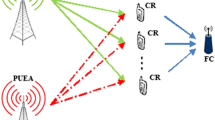Abstract
Cognitive radio (CR) is an enabling technology to effectively address the spectrum scarcity, and it will considerably improve the spectrum utilization of future wireless communication systems. Cooperative spectrum sensing (CSS) has been developed to take advantage of spectrum diversity of CR users. Security is an important issue, but not well addressed in CR networks. This study considers a security problem arising from primary user emulation attack (PUEA) in CR networks. In PUEA, a malicious attacker transmits an emulated primary signal and defrauds the CR users to prevent them from accessing spectrum holes. We assume a smart and probabilistic attacker, in the sense that it is able to exactly detect the spectrum holes and it transmits its signals in both vacant and occupied primary bands. Two important PUEA parameters are estimated and then used to obtain the optimal voting rule for minimizing the global error probability. These attack parameters include the probabilities of the PUEA signals in both occupied and unoccupied frequency bands. We formulate and investigate the optimal voting rule for a CR network operating in the presence of a malicious attacker. The obtained results indicate performance improvement provided by the proposed method compared with the conventional methods.






Similar content being viewed by others
References
Ahmadfard A, Jamshidi A, Keshavarz-Haddad A (2015) Game theoretic approach to optimize the throughput of cognitive radio networks in physical layer attacks. J Intell Fuzzy Syst 28(3):1281–1290
Ahmadfard A, Jamshidi A, Keshavarz-Haddad A (2017) Probabilistic spectrum sensing data falsification attack in cognitive radio networks. Signal Process 137:1–9
Akyildiz IF, Lo BF, Balakrishnan R (2011) Cooperative spectrum sensing in cognitive radio networks: a survey. Phys Commun 4(1):40–62
Chen R, Park JM, Hou YT, Reed JH (2008) Toward secure distributed spectrum sensing in cognitive radio networks. IEEE Commun Mag 46(4):50–55
Chen C, Cheng H, Yao Y-D (2011) Cooperative spectrum sensing in cognitive radio networks in the presence of the primary user emulation attack. IEEE Trans Wirel Commun 10(7):2135–2141
Digham F, Alouini M, Simon M (2003) On the energy detection of unknown signals over fading channels. Proc IEEE Int Conf Commun 5:3575–3579
Ghaznavi M, Jamshidi A (2012) Interference impact on the outage capacity of a frequency diversity paradigm in cognitive radio networks. IET Commun 6:179–186
Ghaznavi M, Jamshidi A (2013) Efficient method for reducing the average control bits in a distributed cooperative sensing in cognitive radio system. IET Commun 6:867–874
Ghaznavi M, Jamshidi A (2015) A reliable spectrum sensing method in the presence of malicious sensors in distributed cognitive radio network. IEEE Sens J 15(3):1810–1816
Ghaznavi M, Jamshidi A (2017) Defence against primary user emulation attack using statistical properties of the cognitive radio received power. IET Commun 11:1535–1542
Haykin S (2005) Cognitive radio: brain-empowered wireless communications. IEEE J Sel Areas Commun 23(2):201–220
Jamshidi A (2009) Performance analysis of low average reporting bits cognitive radio schemes in bandwidth constraint control channels. IET Commun 3:1544–1556
Ma J, Zhao G, Li Y (2008) Soft combination and detection for cooperative spectrum sensing in cognitive radio networks. IEEE Trans Wirel Commun 7(11):4502–4507
Mitola J, Maguire GQ (1999) Cognitive radio: making software radios more personal. IEEE Pers Commun 6(4):13–18
Orumwense E, Oyerinde O, Mneney S (2014) Impact of primary user emulation attacks on cognitive radio networks. Int J Commun Antenna Propag 4:19–26
Sharifi AA, Musevi Niya MJ (2016) Defense against SSDF attack in cognitive radio networks: attack-aware collaborative spectrum sensing approach. IEEE Commun Lett 20(1):93–96
Sharifi AA, Sharifi M, Musevi Niya J (2016a) Reputation-based likelihood ratio test with anchor nodes assistance. In: 8th international symposium on telecommunications, 2016
Sharifi AA, Sharifi M, Niya MJM (2016b) Secure cooperative spectrum sensing under primary user emulation attack in cognitive radio networks: attack-aware threshold selection approach. Int J Electron Commun AEU 70(1):95–104
Sharifi M, Sharifi AA, Niya MJM (2018) Cooperative spectrum sensing in the presence of primary user emulation attack in cognitive radio networks: multi-level hypotheses test approach. Wirel Netw 24(1):61–68
Varshney PK (1997) Distributed detection and data fusion. Springer, Berlin
You C, Kwon H, Heo J (2011) Cooperative TV spectrum sensing in cognitive radio for Wi-Fi networks. IEEE Trans Consum Electron 57(1):62–67
Author information
Authors and Affiliations
Corresponding author
Rights and permissions
About this article
Cite this article
Sharifi, A.A., Mofarreh-Bonab, M. Performance Improvement of Cooperative Spectrum Sensing in the Presence of Primary User Emulation Attack. Iran J Sci Technol Trans Electr Eng 42, 493–499 (2018). https://doi.org/10.1007/s40998-018-0067-3
Received:
Accepted:
Published:
Issue Date:
DOI: https://doi.org/10.1007/s40998-018-0067-3




